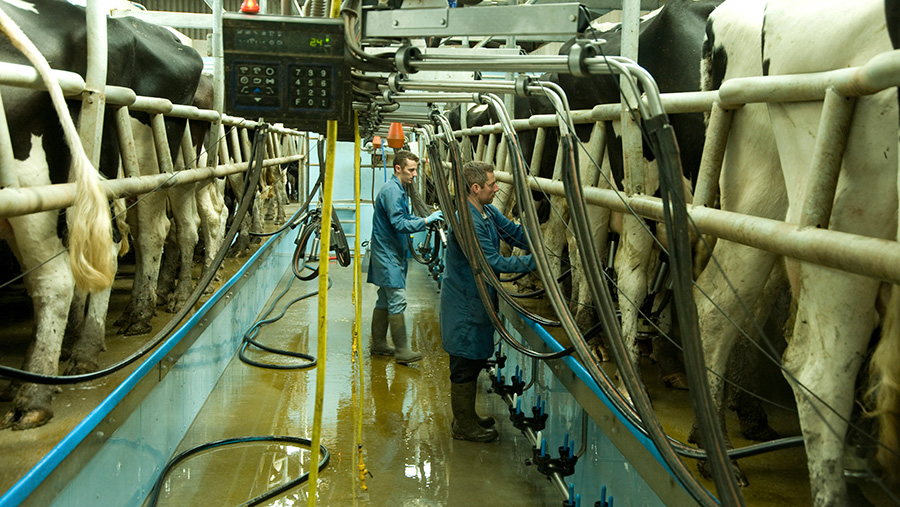RABDF survey aims to assess post-Brexit dairy labour crisis
 © John Eveson/FLPA/imageBROKER/REX/Shutterstock
© John Eveson/FLPA/imageBROKER/REX/Shutterstock RABDF has launched a survey to gauge the concerns of the dairy industry over access to foreign labour when the UK leaves the EU.
The survey – the third of its kind from the RABDF, will analyse dairy farmer’s reliance on a migrant workforce, where workers come from and what employer’s concerns are when the UK renegotiates its relationship with the EU from 1 April next year.
See also: Milk producers face winter costs challenge
Labour problems permeate every stage of the dairy supply chain and this spreads far further than just the farmgate said the NFU.
“Of course access to farmworkers is up in the air at the moment,” said Sian Davies, chief dairy adviser at the NFU.
“But lack of access to migrant labour will affect the number of vets, feed companies, hoof trimmers, tractor drivers and factory workers.”
Strong case needed
She added: “Some processors employ up to 60% foreign workers. The industry need to come together over this and put a strong case forward.”
UK agriculture relies heavily on large numbers of unskilled seasonal labour, especially at harvest time. However, dairy farms require longer term and often highly skilled workers, with one in three milk producers employing foreign labour according the RABDF.
Filling these positions domestically as the government suggests is not feasible in practice according to producers.
Cloud cuckoo land
Farmers Weekly spoke to a number of farmers who said that the desire, work ethic and experience of adequate numbers of UK milkers and dairy labourers simply did not exist.
“Amber Rudd (Home Secretary) must be in cloud cuckoo land if she thinks British workers will fill the gap,” said one producer.
A disproportionate number of migrant workers make up the staff on UK farms. Just 5% of the UK’s workforce were born in EU countries, however, this figure rises to 65% in agriculture.
What the farmers say
Phil Latham, Cheshire dairy farmer
“I employ a number of foreign workers on my farm from Filipino, Zimbabweans, Poles and other eastern European countries, many of whom have been with me for a number of years.
“The Filipinos are superb as they arrive with the qualifications, skills and experience so they know exactly what they are doing from day one.
“We have advertised locally but the desire just isn’t there from domestic applicants. They don’t realise how difficult the industry really is. It’s a relentless, 365 days a year challenge.
“Without access to foreign labour, we would have to dramatically reduce our workforce and in turn scale down operations.
“There is no dairy season and I require workers to commit to the business long term. A high staff turnover loses the transition of knowledge to the next generation of people coming in. My herdsman has been with me for 19 years, another one 10.
“I don’t envisage access to the single market without allowing for a freedom of movement of workers from the EU.
“Otherwise who knows where my team are going to come from; the market is so poor at the moment I can’t increase wages. Why would migrants want to come and work here if they aren’t wanted and the pound is so bad?”
Ken Proctor, East Anglian dairy farmer
“We don’t milk in a traditional dairy heartland and there is no natural source of labour, so we get a lot of eastern European workers through agencies.
“We advertise locally for positions but we either get no response whatsoever or those that do turn up rarely last very long – they lack the right work ethic.
“I have a young Polish worker who has left his wife and 6-month old child in Poland to work here. It’s rare to find that drive in the UK.
“Losing access to this pool of labour post Brexit would be another nail in the dairy coffin which is already really struggling. Without an upsurge in prices, these two combined would really push us to the edge over staying in dairy.
“There’s only so much robotics can take over and even then you need workers to operate it; we must have a continued source of migrant labour because a U-turn in the amount of young people wanting to milk cows isn’t going to happen.”
